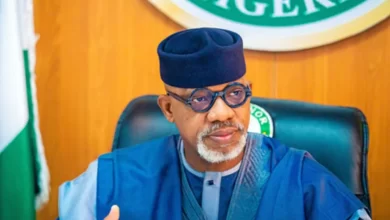Strike, an action too many in Nigeria

Strike in Nigeria today has become the main decimal in resolving issues between government and its workforce. As soon as a set of union or labour organisations picked up tools and get back to work, another union or sets of aggrieved workers are downing tools. This, of course, is the sad situation in Nigeria that makes one wonder if government and the governed do not experience any sort of dispute, no matter how meagre.
What set me thinking that actually led to this write-up is the fact that at the end of it all, they both resolve issues at a roundtable. Why then must there be a strike before the jaw jaw? Why must there be threat and counter threat to achieve what could easily be resolved amicably?
In a matter of just three months, almost every union across sectors in the polity had embarked on one action or the other, for reasons that have eventually summed up to workers’ welfare and work conditions.
ASUU, ASUP, NASU, SSANU, NMA, NLC, TUC, NUPENG, ULC and others from all sectors of the Nigerian economy had downed tools at one time or the other, simply because government had failed the nation and not ever been able to fulfill agreement with the different organs of their employees without acrimony.
Sadly, Nigerian government has reneged on agreements with labour a number of times. The unfortunate aspect is that in cases where lives of innocent people are not lost, especially when doctors, resident or whatever, and nurses, midwives and other health workers go on industrial actions, then some others have their futures jeopardised as it is the case when teachers, and lecturers, ASUP and ASUU members go on strike.
With respect to Cornelius O.S Fawenu, I want to also agree with him when he said, “You don’t need to make noise to be a voice. Simply have great values and add value, you will not beg for attention”. It is high time we stopped making noise to be a force to reckon with. If government and individuals play their parts by adding value to life and the economy, you probably would not have to make a lot of noise with strike.
Let’s take a look at just two to three months back; our country became a butt of jokes to labour and government in other climes, as a result of industrial actions here and there. For instance, Academic Staff Union of Universities (ASUU) on August 13, 2017, embarked on an indefinite strike, which they described as comprehensive and total. In a memo to lecturers, dated August 12, Biodun Ogunyemi, President of the ASUU national strike coordinating committee, said they resolved to go on the strike because the Federal Government failed to implement its 2009 agreement and 2013 Memorandum of Understanding (MoU). Ogunyemi highlighted some of the issues as non-payment of salaries, non-payment of earned academic allowance (EAA), removal of universities staff schools from funding by government and non-implementation of provisions of the 2014 Pension Reform Act with respect to retired professors and their salaries, amongst others.
On their part, the Resident doctors on Monday, September 4, 2017, started an indefinite strike nationwide to press home their own demands, which among others, include payment of salary arrears, stagnated promotion and halt to alleged diversion of funds meant for them by Chief Medical Directors (CMDs). The United Labour Congress (ULC) also embarked on an indefinite strike when the Federal Government failed to meet its demand, that was barely two weeks after the Federal Ministry of Labour and Employment responded to the workers through a letter, which the ULC said “largely failed to adequately address the critical issues raised in our demands.”
In a statement signed by the President, ULC, Joe Ajaero, the union urged Nigerians to take precaution and stock up necessities, saying, “The strike will be very effective as we hope to cripple all modes of transportation within the nation; ensure a total blackout nationwide; cut off petroleum product supplies; and disrupt banking operations, which will make life a bit more difficult for Nigerians.”
The Nigeria Union of Petroleum and Natural Gas Workers, NUPENG, an affiliate of ULC, recently stopped loading of products, including aviation fuel. Also, the electricity workers, an arm of the National Union of Electricity Employees, NUEE, the National Association of Aircraft Pilots and Engineers, NAAPE, and National Union of Railway Workers, asked members to down tools and join the strike.
The Joint Health Sector Unions, JOHESU, embarked on a nationwide strike that took effect from midnight, Wednesday, 20th September. The indefinite action, according to the union was called to draw the Federal Government’s attention to their plight. JOHESU Chairman highlighted refusal of the Federal Government to implement series of MoUs, agreements and court cases, which JOHESU won at the National Industrial Court of Nigeria as part of the reasons for the strike. He also said that neglect of members was part of the reasons for embarking on the indefinite strike. The union however appealed to the Federal Government to tow the part of honour and implement all agreements as failure to do so fifteen days into the industrial action, members in the state and local governments nationwide would be left with no choice than to join the strike.
Just very recently, Medical and Health Workers Union chapter of National Agency for Food Drugs Administration and Control, NAFDAC, embarked on an indefinite strike, demanding improved welfare. The union wants the management to implement agreed welfare package entered in 2013. It was also demanding immediate retirement of the agency’s acting Director General, Yetunde Oni. Part of the union’s demands is that Mrs. Oni should hand over to the immediate senior officer before the appointment of a substantive director-general. In addition, Idu Isua, the vice chairman of the union, while addressing members, said the union signed an agreement with the management and the Minister of Health to review its welfare package in 2013, but the demands were yet to be met.
Their grouse, according to Isua, is that the Minister of Health and NAFDAC management, as well as the Wages and Salaries Commission, agreed on upward review of members’ pay after their strike in 2013. He said, “we resolved that funds be drawn from our Internally Generated Revenue to finance the upward reviewed package of staff but to our greatest surprise, nothing was done since then.”
We talk about fallen education standard, yet ASUU was on strike for several months, ASUP for about eight months, Resident Doctors for about two months, in the course of which some lives were lost.
Also, the non-teaching staff under the umbrella of Joint Action Committee made up of the National Association of Academic Technologists, NAAT, Non-Academic Staff Union of Educational and Associated Institutions, NASU and the Senior Staff Association of Nigerian Universities, SSANU, had directed its members to proceed on nationwide strike, as a result of unresolved issues with government. The three unions in the notice for the declaration of strike accused the Federal Government of neglecting the agreements it freely entered into with the unions since 2009 and the refusal of government to obey the judgment of the National Industrial Court that called for the reinstatement of sacked teachers of University Staff Schools.
Although both the teaching and non-teaching staff unions have suspended their industrial actions and activities picked up again in our universities across the country, it remains to be seen if the government would, this time around, honour its agreements with the unions, to avoid another round of industrial action. Unfortunately, the students bear the brunt of the fight between two elephants, in this wise, government and university and polytechnic staff.
My take is to avoid becoming a laughing stock among comity of nations, the labour unions and the government must be seen to have done their own parts, in the interest of peace, stability, and progress in Nigeria.





